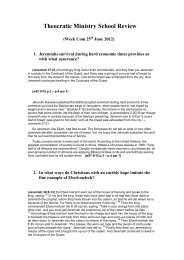1964 Awake! - Theocratic Collector.com
1964 Awake! - Theocratic Collector.com
1964 Awake! - Theocratic Collector.com
Create successful ePaper yourself
Turn your PDF publications into a flip-book with our unique Google optimized e-Paper software.
DOES intelligent life exist in<br />
outer space? Sciencefiction<br />
writers have long been<br />
writing fantastic stories about<br />
"people" on other planets. However,<br />
much more reliable scientists<br />
have now begun to talk<br />
seriously about the possibility<br />
that life will be found elsewhere<br />
in the universe.<br />
Fordham University chemist<br />
Bartholomew Nagy recently led<br />
a team that thought it had<br />
found microscopic fossil life<br />
forms in a meteorite that fell<br />
in France a hundred years ago.<br />
Spectacular newspaper reports<br />
termed this positive proof of<br />
extraterrestrial life. However,<br />
they did not give equal space to<br />
the fact that other scientists<br />
pointedly disagreed.<br />
Scientists have conferred<br />
with a U.S. Congressional <strong>com</strong>mittee<br />
on the possibility that<br />
life could be found on other<br />
planets. The principal conclusion<br />
at the time was that even<br />
if material life does exist else·<br />
where, no one was willing to<br />
spend the fantastic sums of<br />
money that would be necessary<br />
to get in touch with it.<br />
Other Kinds of Life<br />
V. Axel Firsoff, writing in<br />
the British scientific publica.<br />
tion Discovery, said astrono.mers<br />
have considered "the<br />
problem of life beyond the<br />
Earth . . . strictly from the<br />
narrow viewpoint of terrestrial<br />
organisms . . . it is beginning<br />
to be widely felt that this one·<br />
sided approach has be<strong>com</strong>e out·<br />
dated." Scientists no longer<br />
SEPTEMBER 8, <strong>1964</strong><br />
think all life must be our kind<br />
of oxygen·breathing, water·<br />
drinking life. Firsoff proposes<br />
"only one selected alternative<br />
scheme of 'pseudo·organic<br />
chemistry' in which liquid am·<br />
monia replaces water." He says<br />
many other possibilities exist,<br />
but suggests that ammonia in<br />
the atmosphere of the giant<br />
planets and perhaps on some of<br />
their satellites could support<br />
this kind of life. "Jovian animals,"<br />
he says, "could breathe<br />
nitrogen and drink liquid am·<br />
monia. Whether they do remains<br />
to be seen."<br />
Dr. Ralph E. Lapp, special<br />
editor of the Bulletin 0/ the<br />
Atomic Scienti8ts, thinks the<br />
places where life may exist are<br />
too far away for man ever to<br />
reach. The still theoretical ion<br />
rocket may someday be used to<br />
attain the fantastic velocity of<br />
a hundred miles a second. But<br />
even at that speed our closest<br />
stellar neighbor in space, Alpha<br />
Centauri, is eight thousand<br />
years away! Since it is not imaginable<br />
that man couId travel<br />
such distances, Lapp proposes<br />
we listen for them. He thinks<br />
he knows what radio frequen·<br />
cies an intelligent society would<br />
use to <strong>com</strong>municate from remote<br />
space-frequencies close<br />
to the 21-centimeter hydrogen<br />
note. In 1960 the U.S. National<br />
Radio Astronomy Observatory<br />
near Greenbank, West Virginia,<br />
tried listening to two of the<br />
nearest stars, but without initial<br />
success. Lapp thinks an intelligent<br />
society could send an<br />
understandable message to




